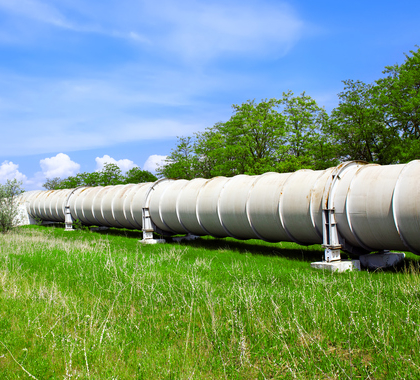Washington state’s Supreme Court invalidated portions of the state Department of Ecology’s (DEC) rules applying greenhouse gas emission caps to indirect emitters such as natural gas companies and fuel distributers.
The court sent the case back to lower courts to decide whether DEC’s program limiting emissions from large direct emitters is legal under the state’s 1967 Clean Air Act (CAA).
The case stems from a July 2015 executive order by Gov. Jay Inslee, who, in response to the state legislature declining to enact legislation he supported regulating greenhouse gas emissions, ordered DEC to impose binding caps on carbon dioxide emissions from large direct emitters and indirect emitters in an attempt to meet greenhouse gas reduction targets established in a 2008 state law.
DEC’s regulation would have required businesses in dozens of affected industries to cap and reduce carbon dioxide emissions by an average of 1.7 percent a year or pay for equivalent reductions by others.
Long Battle
The Association of Washington Business (AWB) filed a suit in 2015 to overturn DEC’s rules, arguing caps on greenhouse gas emissions must be imposed through legislation, not through action by executive agencies.
Thurston County Superior Court Judge James Dixon sided with AWB in a December 2017 ruling invalidating major portions of DEC’s rules as they applied to refineries, fuel distributors, and other major industrial emitters.
Dixon ruled neither the governor nor DEC could create regulations to force gasoline and natural gas distributors and similar businesses—which do not burn fuel—to make emission reductions without specific legislative authority.
The DEC, joined by environmental groups that had offered friend of the court briefs defending DEC’s regulations, appealed Dixon’s decision, arguing Washington’s CAA granted the agency broad authority to regulate air emissions.
Supremes Say No, in Part
In a five-to-four ruling, the state Supreme Court upheld Dixon’s determination DEC had exceeded its legal authority in applying clean air standards to “indirect emitters.” The court remanded the rules covering large direct emitters back to the lower court to determine their legality.
Only the legislature may impose clean air regulations on indirect emitters, wrote Chief Justice Debra Stephens in her opinion for the majority.
“We are confident that if the State of Washington wishes to expand the definition of emission standards to encompass ‘indirect emitters,’ the Legislature will say so,” Stephens wrote. “In the meantime, Ecology may not claim more authority than the Legislature has granted in the Act.”
Businesses Remain Concerned
The state Supreme Court’s ruling may save consumers money, but if the rules on large emitters are upheld by the lower court, it could cost the state businesses and jobs, said AWB president Kris Johnson in a statement.
“If it was allowed to stand, the rule would have forced natural gas and fuel suppliers to pass on increased costs to families, making it more expensive to heat homes, drive to work, and buy groceries, and it would have raised transportation and other costs for all employers, particularly small businesses,” Johnson said. “Employers remain concerned, however, about the health of the state’s manufacturing sector.
“If the part of the rule remanded to the lower court is ultimately allowed to stand, it could lead some industries to move operations to higher carbon states or countries and avoid investing in Washington’s clean economy, an outcome that would not only reduce family-wage jobs here but also increase global carbon emissions,” Johnson said.
Victory for Rule of Law
The state Supreme Court’s ruling simultaneously prevented government overreach and upheld the public’s right to have a say in the rules imposed on them, state Sen. Doug Ericksen (R-Ferndale), the ranking Republican on the Senate Environment, Energy, and Technology Committee, said in a press statement.
“This was a victory for the rule of law and for the people of the state of Washington,” Ericksen said. “The Inslee Administration overstepped its authority when it decided to force a cap-and-trade program on the state of Washington without a vote of the Legislature.
“The people need to be included in decisions like these,” Ericksen said. “The costs would have been passed along to consumers, and they would have been enormous—anywhere from $400 million to $6.8 billion over 20 years, according to the Department of Ecology’s own estimates.”
Government should always be accountable to the people, Ericksen says.
“This case was a classic example of government arrogance and overreach,” Ericksen said in his statement. “The court was right to rein in the Inslee Administration and the Department of Ecology.
“The people and their representatives in the Legislature cannot be cut out of the decisions that will affect their lives,” Ericksen stated.
‘Sank of its Own Accord’
This bill was really about raising revenue, not fighting climate change, says Todd Myers, director of the Center for the Environment at the Washington Policy Center.
“Back in 2015, the governor’s cap-and-trade bill sank of its own accord because it tried to raise $1 billion in carbon-fee revenue for the state budget, but Inslee couldn’t even get House Democrats to agree to what was essentially a huge tax increase,” Myers said. “A bipartisan majority in the Legislature turned down a cap-and-trade system for Washington, and Washington voters have twice voted against carbon taxes.
“Now the courts have also rejected this excessive grab for authority to impose a system everyone else has overwhelmingly rejected,” Myers said. “The Legislature is now considering simply delegating their power to the Executive, so they can claim they took action on climate change without being held responsible for a policy they know is both irresponsible and unpopular.”
Duggan Flanakin ([email protected]) writes from Austin, Texas.
Official Connections
Washington state Sen. Doug Ericksen (R-Ferndale): http://dougericksen.src.wastateleg.org/; [email protected]




